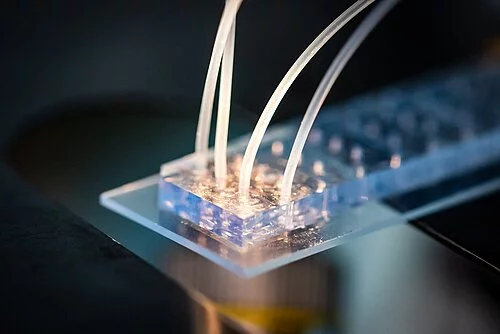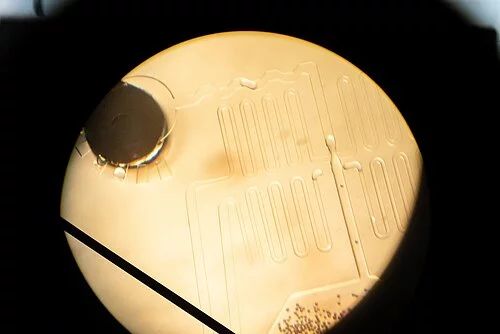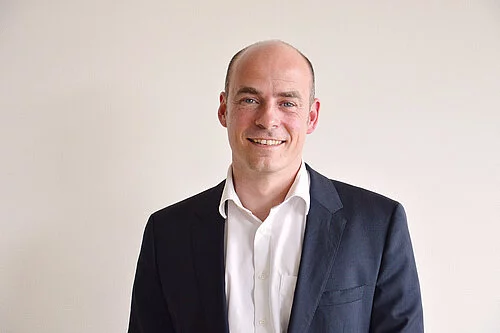Improving European healthcare through cell-based interceptive medicine
EU initiative with Kiel participation wants to track human cells over the course of life, detect changes and thus specifically intercept diseases.
Hundreds of participants from research, clinic, industry and politics from all around Europe are united by a vision of how to revolutionize healthcare. In two publications – a perspective article in Nature and the LifeTimeStrategic Research Agenda – they now present a detailed roadmap of how to leverage the latest scientific breakthroughs and technologies over the next decade, to track, understand and treat human cells throughout an individual’s lifetime. The perspective article was published today (7 September 2020) in the renowned scientific journal Nature.
The LifeTime initiative, including members of the cluster of excellence “Precision Medicine in Chronic Inflammation” (PMI), has developed a strategy to advance personalised treatment for five major disease classes: cancer, neurological-, infectious-, chronic inflammatory- and cardiovascular diseases. The aim is a new age of personalised, cell-based interceptive medicine for Europe with the potential of improved health outcomes and more cost-effective treatment, resulting in profoundly changeing a person’s healthcare experience.
Earlier detection and more effective treatment of diseases
To form a functioning, healthy body, our cells follow developmental paths during which they acquire specific roles in tissues and organs. But when they deviate from their healthy course, they accumulate changes leading to disease which remain undetected until symptoms appear. At this point, medical treatment is often invasive, expensive and inefficient. However, now we have the technologies to capture the molecular makeup of individual cells and to detect the emergence of disease or therapy resistance much earlier Using state-of-the-art single-cell and imaging methods, combined with artificial intelligence and personalized disease models, the participants in "Life Time" not only want to predict the onset of a disease earlier, but also select the most effective therapy for each patient. Targeting disease-causing cells to intercept disorders before irreparable damage occurs could substantially improve the outlook for many patients and has the potential of saving billions of Euros of disease-related costs in Europe.
A detailed roadmap for implementing LifeTime
The perspective article “LifeTime and improving European healthcare through cell-based interceptive medicine” and the LifeTime Strategic Research Agenda (SRA) explain how these technologies should be rapidly co-developed, transitioned into clinical settings and applied to the five major disease areas. Close interactions between European infrastructures, research institutions, hospitals and industry will be essential to generate, share and analyze LifeTime’s big medical data across European borders. The initiative’s vision advocates ethically responsible research to benefit citizens all across Europe.
According to Professor Nikolaus Rajewsky, scientific director of the Berlin Institute for Medical System Biology at the Max Delbrück Center for Molecular Medicine and coordinator of the LifeTime Initiative, the LifeTime approach is the way into the future: "LifeTime has brought together scientists across fields – from biologists, to clinicians, data scientists, engineers, mathematicians, and physicists – to enable a much improved understanding of molecular mechanisms driving health and disease. Cell-based medicine will allow doctors to diagnose diseases earlier and intercept disorders before irreparable damage has occurred. LifeTime has a unique value proposition that promises to improve the European patient’s health.
Dr. Geneviève Almouzni, Director of research at CNRS, honorary director of the research center from Institut Curie in Paris and co-coordinator of the LifeTime Initiative believes that the future with LifeTime offers major social and economic impact: “By implementing interceptive, cell-based medicine we will be able to considerably improve treatment across many diseases. Patients all over the world will be able to lead longer, healthier lives. The economic impact could be tremendous with billions of Euros saved from productivity gains simply for cancer, and significantly shortened ICU stays for Covid-19. We hope EU leaders will realize we have to invest in the necessary research now."
In Kiel, Professor Philip Rosenstiel, member of the steering committee of the Cluster of Excellence PMI and Director of the Institute for Clinical Molecular Biology (IKMB) of CAU and the University Medical Center Schleswig-Holstein (UKSH), Campus Kiel, is participating in the initiative. In the initiative, he coordinates the sub-area dealing with chronic inflammation, i.e. the core competence of the PMI Excellence Cluster. "We hope to strengthen the European research work in order to jointly break down diseases to processes in individual cells in the future," said Rosenstiel. "With so-called single cell sequencing, we can analyze thousands of human cells simultaneously and then simulate the individual inflammatory reaction in cell models. In this way, we hope to better understand the misprogramming of certain immune cells and to make this knowledge available for the selection of therapeutic procedures," Rosenstiel continues.
About LifeTime
The LifeTime Initiative is a growing community of more than 100 leading European research institutions and hospitals, together with international advisers and over 80 supporting companies. LifeTime includes the preeminent European laboratories developing multi-omic strategies, scientific infrastructures, bioimaging and computational technologies, as well as world-renowned laboratories in the area of personalized disease models, bioethicists and a core group of leading clinician scientists. Many of the involved institutions include or are linked to translational/clinical research facilities and hospitals, ensuring that LifeTime discoveries can be rapidly translated into clinical practice.
Magnification of miniature chips: Single cells are encapsulated in tiny droplets and supplied with reagents for further processing.
Cells isolated from tissue are channeled into miniature chips for processing of individual cells.
Original publications
- Rajewsky, N. et al. LifeTime and improving European healthcare through cell-based interceptive medicine. Nature (2020). DOI:10.1038/s41586-020-2715-9
- LifeTime Strategic Research Agenda
Scientific contact
Prof. Dr. Philip Rosenstiel
Institute for Clinical Molecular Biology
Kiel University (CAU), University Medical Center Schleswig-Holstein, Campus Kiel (UKSH)
+49 431/500-15111
p.rosenstiel@mucosa.de
Press contact LifeTime
Valentin Popescu
Communication manager for the LifeTime Initiative
Max Delbrück Center for Molecular Medicine in the Helmholtz Association (MDC)
030/9406-2136
valentin.popescu@mdc-berlin.de
About the Cluster of Excellence PMI
The Cluster of Excellence "Precision Medicine in Chronic Inflammation" (PMI) is being funded from 2019 to 2025 through the German Excellence Strategy (ExStra). It succeeds the "Inflammation at Interfaces” Cluster, which was already funded in two periods of the Excellence Initiative (2007-2018). Around 300 members from eight institutions at four locations are involved: Kiel (Kiel University, University Medical Center Schleswig-Holstein (UKSH), Muthesius University of Fine Arts and Design, Kiel Institute for the World Economy (IfW), Leibniz Institute for Science and Mathematics Education (IPN)), Lübeck (University of Lübeck, University Medical Center Schleswig-Holstein (UKSH)), Plön (Max Planck Institute for Evolutionary Biology) and Borstel (Research Center Borstel - Leibniz Lung Center).
The goal is to translate interdisciplinary research findings on chronic inflammatory diseases of barrier organs to healthcare more intensively, as well as to fulfil previously unsatisfied needs of the patients. Three points are important in the context of successful treatment, and are therefore at the heart of PMI research: the early detection of chronic inflammatory diseases, the prediction of disease progression and complications, and the prediction of individual responses to treatment.
Press office
fbuhse@uv.uni-kiel.de+49 (0)431/880 4682 https://precisionmedicine.de
Cluster of Excellence "Precision Medicine in Chronic Inflammation"
Scientific Office
Head: Dr. habil. Susanne Holstein Postal
Christian-Albrechts-Platz 4, 24118 Kiel, Germany
Contact: Sonja Petermann
+49 (0)431 880-4850, fax: +49 (0)431 880-4894
spetermann@uv.uni-kiel.de
Twitter: PMI @medinflame







